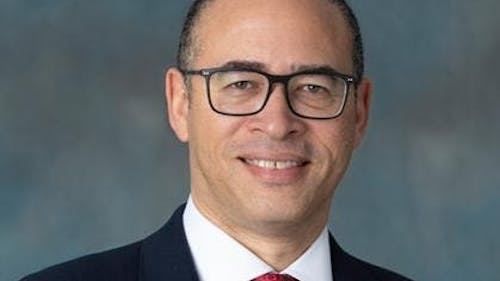Jonathan Holloway officially takes office as president of Rutgers

Jonathan Holloway, former provost of Northwestern University, officially began his role today as the 21st Rutgers University president.
Holloway said the current coronavirus disease (COVID-19) crisis had a major impact on his preparations for entering his new role at the University. He said he was planning on making multiple visits across all campuses in April and May to learn more about Rutgers and the surrounding communities, but the plans were canceled due to the pandemic, and as a result he has not yet been able to tour the campuses.
"One of the things I was most looking forward to is that I was giving each chancellor the right to set the agenda for my visit to his or her space, but the only thing I insisted upon is in every place I need to meet students, and none of that could happen," he said.
COVID-19 also caused drastic changes to University operations over the past few months, which Holloway said he became more involved in as he got closer to taking office. He was not able to help with specific decisions, such as which facilities to keep open or shut down, because he was unfamiliar with the school's regular operations. For bigger, long-term plans, Holloway said former University President Robert L. Barchi kept him updated throughout the process and made sure he was comfortable with all the decisions being made.
Another challenge Holloway faces upon entering office is the financial restrictions imposed by COVID-19. The Daily Targum previously reported the Board of Governors adopted a tentative budget for the upcoming year that will likely change due to various economic variables, including the loss of state funding and a drop in enrollment. Some University employees, including part-time lecturers and dining hall workers, are also at risk of losing their jobs.
Holloway said administrators want to preserve as many jobs as possible, but said the situation is complex. He said administrators have to consider a variety of factors, including both unionized and nonunionized workers as well as the differences between furloughs and layoffs.
"We want to work with everybody in these cases, and sometimes by contract we literally have to work with everybody in these cases. So that's our guiding principle," he said. "At the same time, the numbers are really bleak, and so we have to do everything we can to be mindful of the limitations of what kind of resources we have available to us."
Holloway also said faculty and staff unions have to negotiate with the Office of Labor Relations regarding alternative budget proposals and said many of their decisions had to be made prior to him taking office.
Holloway, who is the first Black president in the history of the University, is taking office amid nationwide protests against racism and police brutality, including one held at Rutgers. He said his academic background helps him understand the current movement and said that "concrete and measurable action" should be taken to address racial and social justice issues.
To address similar issues at Rutgers, Holloway said he is committed to building a relationship with the community and having an "open-door presidency." He said if administrators and students are able to better communicate, students will not feel like they need to create a petition, a set of demands or a protest to make their voices heard.
"I really do believe that, except for the most hard-headed cases, you can mitigate a lot of protests as an administrator by being a known quantity to your student - in this case, students - that the students know who you are, and they say 'yeah, we're going to disagree on some things but he or she really does want to listen to us,'" he said.
To better meet the needs of the University in the wake of the COVID-19 pandemic and ongoing social justice movements, one of Holloway's future goals is to develop a new strategic plan. He said the current plan, which was approved in 2014, was well-designed but added that some of its goals should reflect the ways the world has changed since then.
During his presidency, Holloway said he hopes to bridge the gaps between the New Brunswick, Newark and Camden campuses to create a more unified University, but in a way that still highlights the strengths and characteristics that make each campus unique.
Holloway said he is also interested in making Rutgers more service-oriented. He said it is important for scholars across disciplines to use their ideas for the benefit of society and cited the Edward J. Bloustein School of Planning and Public Policy as an example of a school already doing this type of work. He said he is already looking into recruiting faculty who can help achieve this goal.
Although undergraduate students still do not know if they can physically return to the University in the Fall 2020 semester due to COVID-19, Holloway said he is looking forward to having everyone back on campus in the future. When everyone returns, he said he hopes to prove his commitment to the community by engaging with students and faculty on campus regularly.
"People (will) discover that they're going to see me walking around the campus, that they're going to see me in Tacoria … they just see me showing up at their recital or something like that," he said. "So I think that kind of cultural shift will exist by people discovering, 'hey, he's showing up.'"



